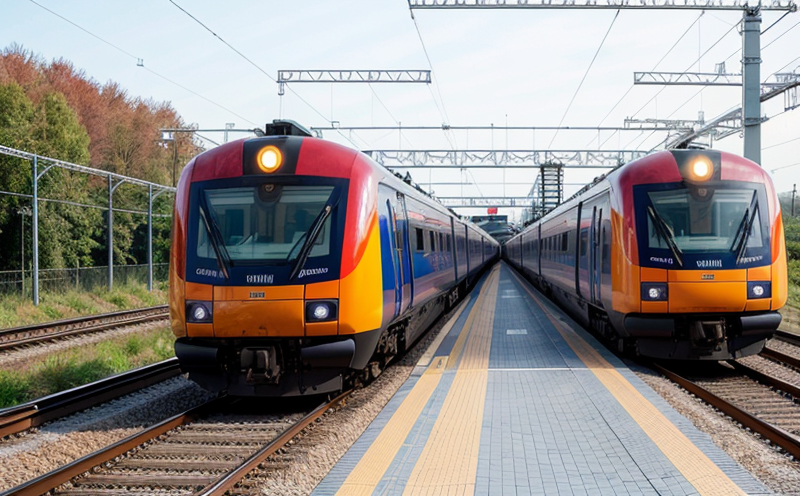EN 14067 Aerodynamic Simulation Testing using Digital Twins
The EN 14067 standard is pivotal for the railway and transportation sectors, particularly in ensuring that new designs meet stringent aerodynamic performance requirements. This service leverages cutting-edge digital twin technology to simulate real-world aerodynamic conditions, providing a more accurate and efficient testing process.
Aerodynamics play a crucial role in optimizing train performance, fuel efficiency, passenger comfort, and overall safety. The challenges in this area are compounded by the complexity of railway systems and the need for precise simulations that account for various operating environments. By employing EN 14067 standards, our laboratory ensures compliance with international best practices while delivering unparalleled accuracy.
Digital twin technology allows us to create a virtual representation of the train or component under test. This digital model mirrors real-world conditions and can be manipulated in simulations to predict performance in different scenarios. Our team uses advanced computational fluid dynamics (CFD) software to analyze airflow around trains, identify areas for optimization, and validate design changes before physical prototypes are built.
The process begins with detailed input from the client regarding the specific parameters of interest such as train speed, track geometry, and environmental conditions. This information is used to configure the digital twin accurately. Once set up, we run simulations that replicate real-world test scenarios, allowing for iterative design improvements without the need for extensive physical testing.
The use of digital twins not only reduces the time and cost associated with traditional testing methods but also enhances precision by minimizing errors inherent in physical prototypes. This approach is particularly beneficial during early stages of product development when flexibility and adaptability are critical.
- Quality Assurance: Ensures that all components adhere to strict EN 14067 specifications.
- Economic Efficiency: Minimizes resource consumption through streamlined design iterations.
- Environmental Impact Reduction: By optimizing aerodynamic performance, we help reduce fuel consumption and emissions.
In summary, our EN 14067 aerodynamic simulation testing using digital twins service provides a robust framework for railway manufacturers to innovate safely and efficiently. This method supports compliance with international standards while delivering actionable insights that improve product quality and sustainability.
Why It Matters
The importance of EN 14067 aerodynamic simulation testing cannot be overstated, especially in the context of modern railway systems. As train speeds increase and environmental regulations become more stringent, achieving optimal aerodynamics becomes increasingly important for both performance enhancement and regulatory compliance.
Compliance with international standards like EN 14067 is not just a matter of avoiding penalties; it also enhances brand reputation and market competitiveness. In a competitive global market, demonstrating adherence to these standards can be a significant advantage. Moreover, meeting such rigorous specifications ensures that products are reliable, safe, and efficient, which translates directly into customer satisfaction.
From an environmental perspective, optimizing aerodynamics through advanced simulation techniques helps reduce the carbon footprint of railway transportation. By minimizing energy consumption during operation, we contribute to a more sustainable future for the industry. This aligns with broader sustainability goals set by governments and international bodies.
The integration of digital twins into this process further underscores its significance. Digital twins provide real-time data insights that can be acted upon immediately, enabling continuous improvement in design and manufacturing processes. This capability is particularly valuable as it allows manufacturers to stay ahead of emerging trends and regulatory changes.
Overall, the implementation of EN 14067 aerodynamic simulation testing using digital twins represents a strategic investment in future-proofing railway systems against changing technological landscapes and environmental challenges.
Benefits
The benefits of our EN 14067 aerodynamic simulation testing service are manifold, offering significant advantages to both manufacturers and end-users. Firstly, it accelerates product development cycles by allowing for rapid prototyping and iteration within a virtual environment.
- Faster Development Cycles: Reduced time-to-market due to quicker design validation.
- Better Compliance: Ensures strict adherence to EN 14067 specifications, minimizing risks of non-compliance penalties.
- Innovation Support: Encourages exploration and experimentation with new materials and designs in a risk-free environment.
- Cost Savings: Reduced material costs through optimized design iterations and fewer physical prototypes needed.
Secondly, the service enhances product reliability by identifying potential issues early in the development process. This proactive approach prevents costly recalls and repairs down the line, ultimately improving customer satisfaction.
Thirdly, our testing methods contribute to environmental sustainability by promoting efficient use of resources. By minimizing waste through precise design iterations, we help reduce the overall ecological impact of railway operations.
In conclusion, this service not only supports compliance with international standards but also drives innovation and sustainability within the industry. It serves as a cornerstone for building trust among stakeholders and contributing to long-term success in the competitive market landscape.
Quality and Reliability Assurance
Our commitment to quality and reliability assurance is unwavering. We adhere strictly to EN 14067 specifications, ensuring that every test conducted meets the highest industry standards. Our methodologies are designed to minimize errors and ensure accurate results.
- Compliance Verification: All tests are verified against EN 14067 requirements to confirm compliance.
- Data Accuracy: Rigorous validation of all data collected during simulations.
- Iterative Refinement: Continuous improvement based on feedback and updated standards.
We invest heavily in maintaining our laboratory’s accreditation, ensuring that it remains at the forefront of testing technologies. Our experienced team is dedicated to providing accurate, reliable, and compliant test results that can be trusted by all stakeholders.





